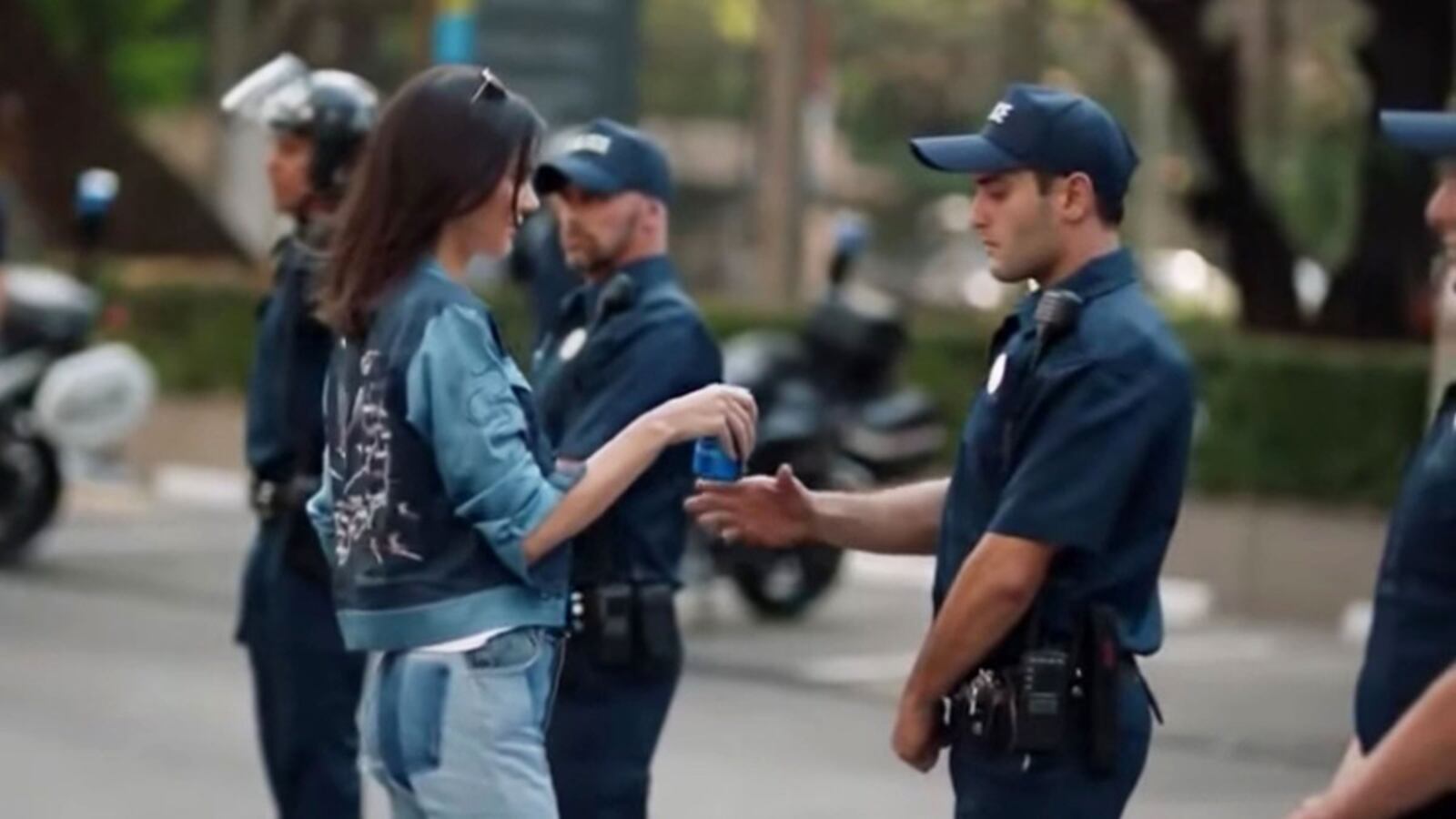It turns out that Kendall Jenner did not end racism. Bless her heart, she tried.
She saw them all—the Asian man playing cello on the rooftop, the woman in the hijab snapping photos, the ethnically diverse brunchers sharing a laugh—taking to the streets, marching and having the times of their lives protesting...well, the cause is besides the point. Black Lives Matter, we think? Anyway, look how much fun!
She may be in the middle of a photo shoot, but the World’s Coolest March is beckoning. She leaves, struts to the front of the pack, and just when it looks like things may get testy as she comes upon a phalanx of stern-faced cops/killjoys, she has an idea. She hands one a can of Pepsi.
Police brutality? Antagonistic relationships with law enforcement? It was supposed to be over. The cop accepted the can. He tasted that sweet, sweet corn syrup, coating his throat in its all spicy-bubbled, viscous glory. He smiled. It was a truce! The crowd cheered! Resistance accomplished!
The 2017 ad—a grotesque bastardization of wokeness, political action, and the Black Lives Matter movement—made people so angry at the time it was all they could do not to shit in a wig.
It was so instantly pilloried for its glaring tone-deafness that Pepsi pulled the ad immediately. Jenner apologized on her reality show and the world, it seemed, moved on to the next ridiculous celebrity controversy and brand whose time had come to be canceled.
But the ad reannounced itself to the zeitgeist this week like the deafening sound of a soda can lid popping open in a quiet library. It serves as both a reminder of how far off mainstream culture is from the reality of protests and the country’s systemic issues and, sure, as a bit of a comedic distraction.
People on social media wondered, in jest, where Jenner and her Pepsi can have been during the nationwide protests and violent face-offs with police. Shouldn’t the events of the last 10 days have been her red-white-and-blue swirled sphere bat signal?


Protesters began posting photos and videos of themselves trying to offer Pepsi to officers, revealing in practice the utter lunacy of the gesture. They look absolutely insane, marching up to officers in riot gear, mayhem surrounding them, their arms outstretched with a soda. The images are funny, but also scary.
“They hate soda. Fuck the police,” reads one comment on a video of someone attempt to broker peace through beverage.
That people are still talking about this three-year-old ad isn’t just because current events have exposed just how nakedly stupid it truly was. It’s because these things—even a Kendall Jenner Pepsi ad from 2017—do matter.
There’s the cynicism of a brand noticing the mobilization of anger and demands for social justice, and then instinctively strategizing how to capitalize on the political energy. Rather than be on the right side of history, the question was: How do we become the brand associated with the positive vibes of this moment in history? How do we become the choice carbonated beverage of the Resistance?
As countless brands post messages of solidarity brewed from a word soup of Black Lives Matter maxims, we’re still left to wonder which are well-intentioned, which are out of perfunctory obligation, which are looking to market to a movement, and which are actually moving to take action and do the work. Has anyone checked to see what Pepsi has been actually doing amidst all this?
There’s the romanticization of empty gestures, the fantasy that emotional social media posts, black squares on Instagram, or pleas to reach out a hand—or a can—to those who disagree with you is all it takes to heal. It’s the misconception that peaceful, non-violent protests are not meant to make the people on the other side uncomfortable—and ignorance of the fact that their discomfort is necessary.
There’s also the fallacy of its imagery. The ad promotes the idea that protesting is, or should be, a party; I’ll bring the cause, you bring the Pepsi—and the fun! And what about the climactic image? The privilege involved in a white woman walking directly up to a police officer with no fear for her own safety, when a black demonstrator doing the same thing might have been arrested or even attacked.
When actress Keke Palmer, just to use one example, confronted and initiated a dialogue with armed crowd enforcement, it was with the knowledge of the risk that carries. Watch any of the countless videos across social media of frontline peaceful protesters beaten, pepper sprayed, tear gassed, and shot at with rubber bullets without initiating the violence.
This disaster of a Pepsi ad has turned out to be one of the most significant pieces of commercialism and celebrity culture of this time, for every misconception it represents and every reality it doesn’t.
For her part, Jenner seems to have evolved her thinking on these issues.
On Tuesday, she posted a carousel of photos pertaining to Black Lives Matter along with a lengthy caption, saying in part, “I will never personally understand the fear and pain that the black community go through on a daily basis, but I know that nobody should have to live in constant fear. I acknowledge my white privilege and promise I will continue to educate myself on how I can help. raging on platforms can not be all that we do in order to repair the system, we need to take real action, off of social media.”
The next day, she posted information about presidential primaries and made a call for followers to go out and vote—the true Pepsi can of change.





